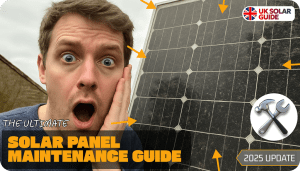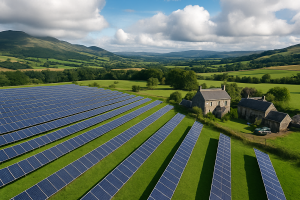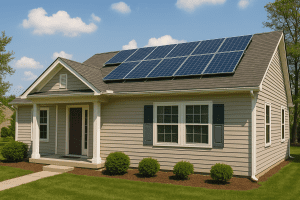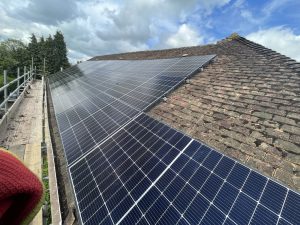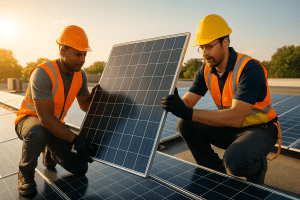New Smart Home Integrations with Solar Panels: What UK Homeowners Should Know

Written By
- Manan Shah
Published on
- 03 May 2025
The world of renewable energy is evolving rapidly, and solar panels are no longer standalone energy solutions. In 2025, the integration of smart home technology with solar panel systems offers UK homeowners the opportunity to achieve greater energy efficiency, financial savings, and environmental impact.
This guide explores how smart home systems can seamlessly connect with solar PV installations, unlocking a future of intelligent energy management and empowering homeowners to maximise the value of their renewable energy investments.
Why Smart Home Integration Matters for Solar Panels
Smart technology enhances the performance and convenience of solar systems by allowing homeowners to:
Optimise Energy Consumption: Use energy when it is most cost-effective or plentiful.
Maximise Solar Usage: Align household energy needs with solar production in real time.
Enhance Comfort: Automate heating, cooling, and appliance usage for greater convenience.
Save More Money: Avoid costly peak-time tariffs by smartly using or storing solar energy.
Support Sustainability: Reduce carbon footprint by using clean energy more efficiently.
The fusion of smart homes and solar panels represents the future of energy management, offering a powerful tool for homeowners seeking independence from traditional energy sources.
Key Smart Home Technologies Compatible with Solar Systems
Several smart home technologies are particularly beneficial when integrated with solar energy systems.
1. Smart Energy Management Systems (EMS)
Energy Management Systems automatically monitor, control, and optimise the flow of electricity within your home.
Real-Time Monitoring: Track solar generation, household consumption, and battery levels.
Smart Scheduling: Automatically shift energy usage to periods of peak solar generation.
Load Prioritisation: Prioritise essential appliances and optimise energy flow accordingly.
2. Smart Thermostats and Heating Controls
Smart thermostats adjust your heating and cooling based on real-time data, weather forecasts, and occupancy.
Maximise Solar Usage: Heat or cool your home when solar energy production is high.
Remote Control: Adjust settings from anywhere via smartphone apps.
Learning Algorithms: Smart thermostats learn usage patterns to optimise comfort and efficiency.
3. Solar-Compatible EV Chargers
Smart EV chargers can integrate directly with your solar system.
Solar-Only Charging: Charge your electric vehicle using excess solar energy.
Timed Charging: Schedule EV charging during peak solar production hours.
Tariff Integration: Optimise charging based on smart energy tariffs.
4. Smart Appliances and Home Automation
Smart appliances can operate intelligently based on solar generation levels.
Dishwashers, Washing Machines, and Dryers: Run cycles when solar energy is abundant.
Water Heating Systems: Heat water using surplus solar energy.
Lighting and Blinds: Adjust automatically based on natural light availability.
How Smart Home Integration Works with Solar Panels
Integrating smart technology with a solar PV system typically involves the following components:
Solar Inverter with Smart Capabilities: Converts solar DC to AC electricity and communicates with smart systems.
Energy Meter or Monitor: Tracks production, consumption, and grid interaction in real time.
Home Energy Management System (HEMS): Controls smart devices, appliances, and energy storage solutions.
Mobile Apps: Allow homeowners to control and monitor their systems remotely.
This interconnected setup allows seamless automation and intelligent energy distribution throughout the home.
Benefits of Smart Solar Integration for UK Homeowners
Enhanced Energy Independence
Homeowners can rely more on self-generated energy and reduce reliance on grid power.
Greater Financial Savings
Optimising energy usage patterns increases the direct use of solar energy, maximising savings and avoiding expensive grid electricity charges.
Improved Home Comfort and Convenience
Automated lighting, heating, cooling, and appliance usage create a comfortable living environment without manual adjustments.
Future-Proofing Your Property
A smart solar home increases property value and positions your home at the forefront of modern, sustainable living.
Environmental Impact
Maximising the use of renewable energy further reduces carbon emissions and contributes to a greener future.
Planning Your Smart Solar Home: Key Considerations
When planning to integrate smart home technology with your solar panel system, consider the following:
1. System Compatibility
Choose devices and appliances that are compatible with your solar inverter and energy management system.
2. Scalability
Select systems that allow easy expansion, such as future battery storage, additional solar panels, or electric vehicle chargers.
3. Installation Expertise
Work with experienced, accredited installers who understand smart system integration and can advise on optimal configurations.
4. Data Security
Ensure all smart devices use secure, encrypted communication protocols to protect your data and privacy.
5. Future Upgrades
Stay informed about upcoming technologies, such as virtual power plants (VPPs) and dynamic energy tariffs, to keep your system future-ready.
Real-World Smart Solar Applications in the UK
Smart Load Shifting
During midday when solar generation peaks, excess energy powers high-energy appliances like washing machines or dishwashers.
Intelligent Battery Charging
Battery systems charge using surplus solar electricity and discharge during evening peak tariff periods.
EV Smart Charging
Electric vehicles are charged primarily using self-generated solar energy, with charging sessions automatically scheduled during periods of excess solar production.
Automated Heating Systems
Homes preheat or precool during times of strong solar generation, reducing reliance on the grid during expensive periods.
These applications are already helping UK homeowners maximise savings and reduce environmental impact.
Smart Tariffs and Solar Systems
Some UK energy providers now offer smart tariffs that work in synergy with solar and battery systems:
Time-of-Use Tariffs: Lower rates during off-peak periods.
Agile Tariffs: Dynamic pricing based on wholesale energy rates.
Export Tariffs: Get paid for sending surplus energy back to the grid.
Smart solar homes can automatically adjust consumption patterns to capitalise on these pricing models, further boosting financial savings.
Preparing for a Smart Solar Installation
Energy Audit
Conduct an energy audit to understand your household consumption patterns and identify the best opportunities for smart energy optimisation.
Define Priorities
Decide which appliances and systems should be prioritised for smart control and solar integration.
Plan for Storage
Consider integrating battery storage now or leave provisions for easy future installation.
Internet Connectivity
Ensure strong Wi-Fi coverage across your property to support connected devices and remote control features.
Future-Proof Infrastructure
Install conduits and spaces for future smart upgrades, even if you do not implement all technologies immediately.
Conclusion: Embrace the Future with Smart Solar Homes
Smart home integration with solar panel systems is the next major step in sustainable living. By combining renewable energy generation with intelligent energy management, UK homeowners can enjoy greater savings, superior comfort, and enhanced energy independence.
The transition to a smart solar home is not just about producing clean energy; it’s about using that energy intelligently, efficiently, and in ways that benefit both your lifestyle and the environment.
Now is the perfect time to embrace the power of smart home solar integration. With careful planning and expert support, your home can become a model of modern, sustainable living.
Speak with Solar4Good today to learn how smart solar solutions can transform your home into a future-ready, energy-efficient powerhouse.
FAQ: Smart Solar Homes UK
Q: Can I upgrade my existing solar panel system with smart home technology? A: Yes, many existing solar systems can be upgraded with smart energy management devices and compatible inverters.
Q: Do I need battery storage to benefit from smart solar integrations? A: While batteries enhance the benefits, you can still optimise direct solar usage and enjoy savings without storage.
Q: Will smart solar systems work during a power outage? A: Some systems offer backup power capabilities, but this typically requires a solar battery and specialised equipment.
Q: How much can I save by integrating smart home technology with my solar system? A: Savings vary based on household consumption and optimisation strategies, but significant reductions in energy bills are typical.
Q: Is smart home technology secure? A: Reputable smart home systems use encrypted communication protocols to ensure data security and system integrity.
Discover the endless possibilities of combining smart home technology with your solar energy system and take control of your home’s future today.

